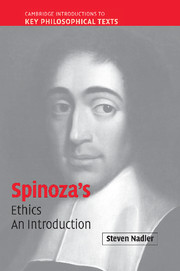Book contents
3 - On God: substance
Published online by Cambridge University Press: 05 June 2012
Summary
Writing in theTreatise on the Emendation of the Intellect, Spinoza says that our well-being and happiness, indeed our ultimate perfection, consists in a certain state of knowing. Above all, we need to understand ourselves and the nature and powers of the human mind. But, he insists, this will come about only when we understand the natural order of which we are indelibly a part, and especially the highest causes from which all things bodily and spiritual follow.
Since it is clear through itself that the mind understands itself the better, the more it understands of Nature, it is evident from that that this part of the Method will be more perfect as the mind understands more things, and will be most perfect when the mind attends to or reflects on knowledge of the most perfect Being.
(TIE, G II.16/C I.19)The highest good for a human being is the knowledge of God and Nature.
Establishing this conclusion with demonstrative certainty is the main project of the Ethics. And in Part One, Spinoza takes the first step of his project by proving the most general and important metaphysical truths about God and Nature. His startling conclusion is that, in fact, God and Nature are one and the same thing. Rather than speaking of ‘God and Nature,’ as if they are distinct, we should in fact speak of ‘God or Nature,’ Deus sive Natura, where the two words are simply different ways of referring to one subject.
- Type
- Chapter
- Information
- Spinoza's 'Ethics'An Introduction, pp. 52 - 83Publisher: Cambridge University PressPrint publication year: 2006



